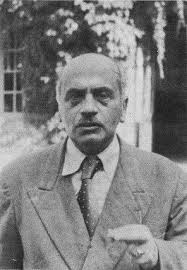Emilio Oribe
Emilio Oribe (1884–1971) was a prominent Uruguayan poet, essayist, and philosopher, whose work and influence spanned the first half of the 20th century. He is considered one of the leading figures in Uruguayan literature and intellectual circles, contributing significantly to Latin American thought and modernist literature.
Biography[edit | edit source]
Born in Montevideo, Uruguay, on November 13, 1884, Emilio Oribe was deeply involved in the cultural and intellectual life of his country from a young age. He pursued higher education in medicine and philosophy, fields that would deeply influence his literary and philosophical work. Oribe's career was marked by his dual interest in both the sciences and the humanities, which is reflected in his diverse body of work that includes poetry, essays, and philosophical treatises.
Literary Career[edit | edit source]
Oribe's literary output is characterized by its depth and variety. His poetry, known for its rich imagery and complex symbolism, explores themes of identity, time, and the cosmos. He was a member of the Generation of '900, a group of Uruguayan writers and intellectuals that emerged in the early 20th century and played a crucial role in the country's cultural development.
Among his most notable works is the poem "El Muerto," which delves into the existential and metaphysical concerns that pervade much of his writing. Oribe's essays and philosophical writings also reflect his wide-ranging interests, from metaphysics and ontology to the role of art and literature in society.
Philosophical Contributions[edit | edit source]
Oribe's philosophical work is marked by its originality and depth. He developed a unique metaphysical system that sought to reconcile the material and spiritual dimensions of existence, drawing on his extensive knowledge of Western philosophy and his own insights into the human condition. His philosophy is characterized by a profound concern with the nature of reality and the possibilities of human knowledge and creativity.
Legacy[edit | edit source]
Emilio Oribe's influence on Uruguayan and Latin American literature and philosophy is significant. His work continues to be studied and admired for its intellectual rigor and poetic beauty. Oribe's contributions to the cultural and intellectual life of Uruguay have made him a key figure in the country's history, and his legacy is celebrated by scholars and readers alike.
Oribe passed away on June 28, 1971, in Montevideo, but his work remains a vital part of the Latin American literary and philosophical canon.
Selected Works[edit | edit source]
- El Muerto
- La Poesía de Rubén Darío
- El Plan De La Obra
- Metafísica Del Fenómeno
See Also[edit | edit source]
Search WikiMD
Ad.Tired of being Overweight? Try W8MD's physician weight loss program.
Semaglutide (Ozempic / Wegovy and Tirzepatide (Mounjaro / Zepbound) available.
Advertise on WikiMD
|
WikiMD's Wellness Encyclopedia |
| Let Food Be Thy Medicine Medicine Thy Food - Hippocrates |
Translate this page: - East Asian
中文,
日本,
한국어,
South Asian
हिन्दी,
தமிழ்,
తెలుగు,
Urdu,
ಕನ್ನಡ,
Southeast Asian
Indonesian,
Vietnamese,
Thai,
မြန်မာဘာသာ,
বাংলা
European
español,
Deutsch,
français,
Greek,
português do Brasil,
polski,
română,
русский,
Nederlands,
norsk,
svenska,
suomi,
Italian
Middle Eastern & African
عربى,
Turkish,
Persian,
Hebrew,
Afrikaans,
isiZulu,
Kiswahili,
Other
Bulgarian,
Hungarian,
Czech,
Swedish,
മലയാളം,
मराठी,
ਪੰਜਾਬੀ,
ગુજરાતી,
Portuguese,
Ukrainian
Medical Disclaimer: WikiMD is not a substitute for professional medical advice. The information on WikiMD is provided as an information resource only, may be incorrect, outdated or misleading, and is not to be used or relied on for any diagnostic or treatment purposes. Please consult your health care provider before making any healthcare decisions or for guidance about a specific medical condition. WikiMD expressly disclaims responsibility, and shall have no liability, for any damages, loss, injury, or liability whatsoever suffered as a result of your reliance on the information contained in this site. By visiting this site you agree to the foregoing terms and conditions, which may from time to time be changed or supplemented by WikiMD. If you do not agree to the foregoing terms and conditions, you should not enter or use this site. See full disclaimer.
Credits:Most images are courtesy of Wikimedia commons, and templates Wikipedia, licensed under CC BY SA or similar.
Contributors: Prab R. Tumpati, MD

